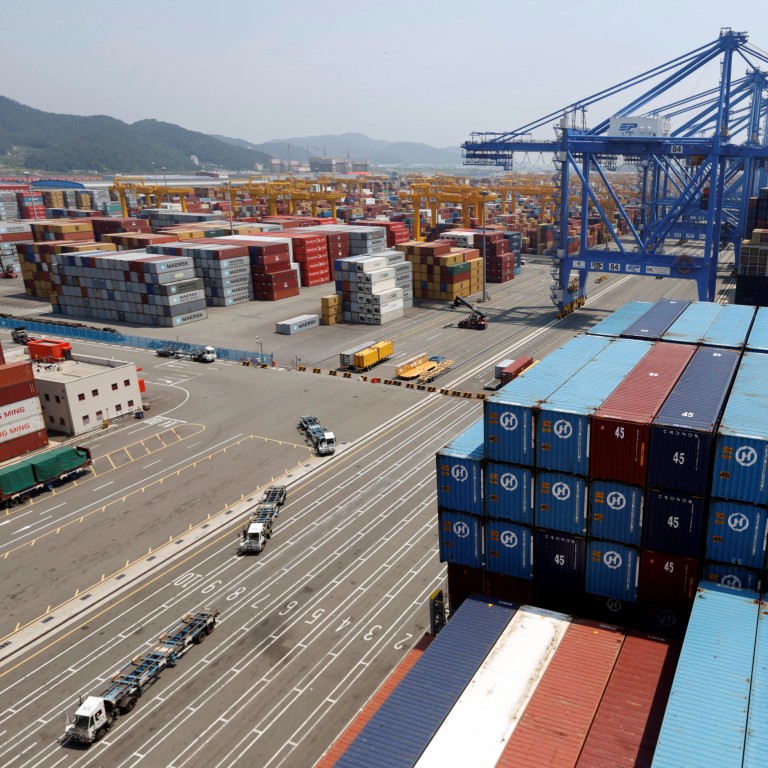
China’s reopening stirs hopes that South Korea can turn around a record trade deficit
- South Korea logged a US$12.69 billion trade deficit in January, with the total value of exports falling by 16.6 per cent from a year earlier
- Exports to China decreased by 31.4 per cent in January year on year, due primarily to economic disruption from Covid outbreaks
China’s reopening will help improve South Korea’s trade balance over time, the Korean finance minister said on Wednesday, as Seoul announced its biggest trade deficit ever in January.
South Korea recorded a US$12.69 billion trade deficit in the first month of the year, with the total value of exports falling by 16.6 per cent from a year earlier, bringing up four consecutive months of declining exports.
“The export and import data for January released today indicate that our economy is still in the middle of a severe cold wave,” said Choo Kyung-ho, South Korea’s deputy prime minister and Minister of Economy and Finance.
“The future trade balance will be influenced by many variables, but it is expected to gradually improve as seasonal factors diminish as January passes and the effect of China’s reopening is reflected with a time lag.”
South Korea’s economy shrank last quarter, but rebound expected as China reopens
Choo said disruption to China’s economic activity due to the pandemic was one of the main reasons why South Korea’s trade balance deteriorated in January.
Other factors included a seasonal increase in energy imports over winter amid high global costs and a sharp drop in semiconductor export prices. Semiconductors are the biggest export item for South Korea, making up 18.9 per cent of the country’s total export value last year.
South Korea’s exports to China decreased by 31.4 per cent in January year on year, the biggest drop among all trading partners, according to data published on Wednesday by the country’s Ministry of Trade, Industry and Energy.
In comparison, the country’s exports to the Association of Southeast Asian Nations decreased by 19.8 per cent, and fell by 25 per cent and 6 per cent to Latin America and the United States, respectively.
Shipments to the European Union increased by 0.2 per cent and to the Middle East by 4 per cent.
Exports to China were hard hit because of the global economic slowdown and decreasing semiconductor prices, the trade ministry report explained.
A slowing global economy has hurt China’s exports and in turn has affected South Korea’s trade with the world’s second largest economy.
Falling semiconductor prices have also weighed on South Korea’s trade balance with China, as the tiny chips, which power everything from cars to smartphones, are one of its biggest export items.
Last year, 40.3 per cent of South Korea’s total semiconductor exports were to China. Between January 1 and 25, the value of Korean semiconductor exports to China decreased by 46.6 per cent year on year.
The market will eventually improve on the back of China’s reopening and a recovery in mobile phone demand
The trade ministry forecast low prices for semiconductors for some time, but said there was a possibility of an increase in the second half of this year.
South Korean chip makers face other challenges, especially as US sanctions against tech exports to China are tightening.
Kang Min-joo, senior economist at ING Economics, said China’s reopening will have limited positive spillover for the South Korean semiconductor industry.
“The market will eventually improve on the back of China’s reopening and a recovery in mobile phone demand, but Korean chip makers will face another geopolitical challenge from tightening US sanctions against tech exports to China,” said Kang.
South Korean carmakers seek solution to ‘sharp increase’ in Chinese exports
The International Monetary Fund (IMF) forecast the South Korean economy to grow 1.7 per cent in 2023, lower than the previously projected 2.0 per cent.
The economy will perform better in the second half of this year, the IMF’s deputy managing director, Gita Gopinath, said in an interview with the Yonhap News Agency.
“We will see signs of growth recovering, also because of the recovery in China,” Gopinath said on Tuesday.
The Korean trade ministry report noted that despite optimistic predictions that China’s reopening will bring a much needed vitality to the economy, it also harbours economic risks such as inflation and the spread of the coronavirus.


